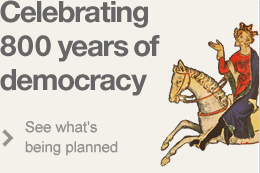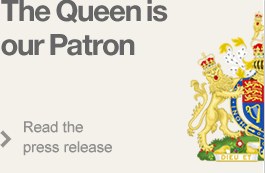Reading up on Magna Carta
It’s always best to begin by looking at the sources, the collections of contemporary narratives and administrative documents from which historians build up their picture of the past. For the reign of King John, these are by the standards of the time, unusually rich. There are several good chroniclers’ accounts and, with the machinery of royal government becoming more bureaucratised, alongside them a range of good administrative sources.
In the thirteenth century the most important centre of historical writing in England was the great Benedictine house of St Albans Abbey in Hertfordshire. The first chronicler there was Roger Wendover. After Wendover’s death in the 1230s, his narrative was added to and continued by his successor, Matthew Paris (d. 1259).
– Wendover’s chronicle, with Paris’s additions, may be read in translation online here.
– The nineteenth-century Bohn edition of Wendover’s ‘Flowers of History’ with a translation by J.A. Giles may be read online here.
– Coxe’s original nineteenth-century edition of the Latin text of Wendover may be read online here.
– A range of chronicle extracts and other source material is available online in the Fordham University internet medieval sourcebook here.
– A rich collection of source material is available in translation in print in English Historical Documents, 3: 1189-1327, ed. Harry Rothwell (London: Eyre and Spottiswoode, 1975), available in good libraries. There is a smaller, but still useful, collection in the Seminar Studies in History volume, J.A.P. Jones, King John and Magna Carta (Harlow: Longman, 1971).
– For Magna Carta itself, go to the website of the British Library, London, where two of the four originals are kept.
– Translations of and commentaries on the Charter are available at the website of the new AHRC-funded project on Magna Carta and its origins.
Secondary Literature
Turning to the secondary literature – that’s to say, the books and articles that historian have written based on the sources – a good starting point is represented by two books in particular: N. Vincent, Magna Carta. A Very Short Introduction (Oxford, 2012), which is especially informative on the historical background to the Charter; and D. Danziger and J. Gillingham, 1215. The Year of Magna Carta (London: Hodder and Stoughton, 2003), which evokes vividly the society in which the Charter was nurtured. Both are compellingly readable. Also sure-footed for background are R. Bartlett, England under the Norman and Angevin Kings (Oxford: Clarendon Press, 2000), M.T. Clanchy, England and its Rulers, 1066-1307 (3rd edition, Oxford: Blackwell, 2006) and R. Huscroft, Ruling England, 1042-1217 (Harlow: Pearson Education, 2005).
– For an excellent brief introduction to the document itself, see C. Breay, Magna Carta: Manuscripts and Myths (British Library, 2002).
– There are two good, wide-ranging books on the Charter itself: J.C. Holt, Magna Carta (Cambridge, 1965, enlarged and reissued 1992; and reissued again with a new introduction, 2015); and published to coincide with the anniversary: D. Carpenter, Magna Carta (Penguin Classics, 2015). The latter, modestly passing itself off as an edition of the Charter with a commentary, is in fact the most complete study of the Charter currently available.
– For a collection of short but effective essays on the making of Magna Carta and the Charter’s later history, see the special issue of the Historical Association’s journal The Historian, 125 (Spring, 2015), edited by Nigel Saul.
– Quite a number of general studies of John’s reign and the making of the Charter have been prompted by the anniversary: D. Jones, Magna Carta. The Making and Legacy of the Great Charter (London: Head of Zeus, 2014); M. Morris, King John: Treachery, Tyranny and the Road to Magna Carta (London: Hutchinson, 2015); and S. Church, King John: England, Magna Carta, and the Making of a Tyrant (London: Macmillan, 2015). D. Starkey, Magna Carta: the Charter that Changed the World (London: Hodder and Stoughton, 2015) , which carries the story beyond the Middle Ages, is the book of a BBC television series.
– The most readable modern biography of King is W.L. Warren’s King John (London, 1961, reissued Yale University Press, 1997). For the background history of the period, an excellent account is found in D.A. Carpenter, The Struggle for Mastery. Britain, 1066-1284 (London: Penguin, 2003). There is also much of interest on the Charter and its sequel in Carpenter’s collected essays: The Reign of Henry III (London: Hambledon Press, 1996).
– For the later history of the Charter, its role in later struggles for liberty, and its elevation to mythic status, an excellent introduction is R.V. Turner, Magna Carta through the Ages (Harlow: Pearson, 2003). For the period from 1300 to the early seventeenth century there is much detail in F. Thompson, Magna Carta. Its Role in the making of the English Constitution, 1300-1629 (Minneapolis, 1948), a great heaping of facts. The speeches and writings of the greater seventeenth-century lawyer, Sir Edward Coke, which invoked the authority of Magna Carta, are all online here.
– On the background to Coke, and the seventeenth-century debates in which Magna Carta figured, there are two useful books: J.G.A. Pocock, The Ancient Constitution and the Feudal Law (Cambridge, 1987); and G. Burgess, The Politics of the Ancient Constitution: An Introduction to English Political Thought, 1603-1642 (London, 1992).
– Two books look at the later history of Magna Carta from a legal angle: A. Arlidge and I. Judge, Magna Carta Uncovered (Oxford: Hart Publishing, 2014), and Magna Carta and the Rule of Law, ed. D. Magraw and A. Martinez (American Bar Association, 2015).
– On the important legacy of Magna Carta in the United States, see two works – A.E. Dick Howard, The Road from Runnymede: Magna Carta and Constitutionalism in America (Charlottesville: University of Virginia Press, 1968); and Magna Carta in America, ed. D.E. Stivison (Baltimore, Maryland: Gateway Press, 1993).
– Among online resources illuminating the later history of Magna Carta, two websites are especially useful. For the UK, for historic declarations of rights and current civil liberties issues, go to Magna Carta Plus here.
– For the significance of the Charter for Americans, see the US National Archives and Record Administration online.
Featured Article
Magna Carta, or as it is properly called the Great Charter of Liberty, was born on 15 June 1215 at Runnymede when King John – Bad King John as he is more commonly known – was persuaded to accede to a number of demands made...
Read on...Recent Articles
- Magna Carta's American Adventure
- 800th anniversary of Bristol...
- Bristol 800 concert and...
- Emancipation and Magna Carta
- Terrorism and Tolerance -...
- Magna Carta
- Magna Carta Benches mark...
- ABA Magna Carta Memorial...
Stay updated
If you would like to keep informed about the work of the Magna Carta Trust and our partners, please sign up to the newsletter below.
Become a Supporter
There are a number of significant supporter opportunities. Register your interest early to ensure the widest range of options.
Find out more




